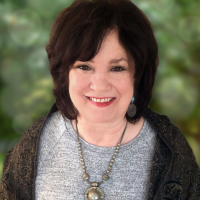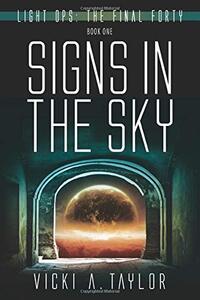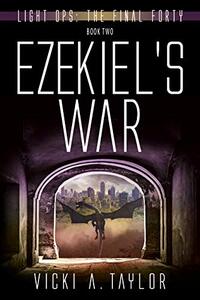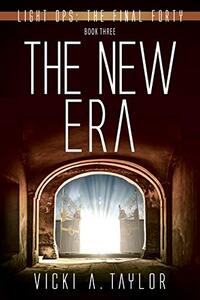Vicki A. Taylor Interview Published on: 17, Oct 2023
 What hobby do you miss most from your childhood? Why?
What hobby do you miss most from your childhood? Why?
Interestingly, the only hobby I don’t engage in now that I did as a child is climbing trees and I don’t miss that. My primary enjoyment as a child was in reading and that I continue to do today. I have added other hobbies such as painting, cooking, and gardening, and, of course, writing, since I have reached mature adulthood. All of them require creativity and feed creativity for the other endeavors. The only limiting factor is time.
Were you an avid reader as a child? Do you still read books?I loved to read as a child and felt an enormous sense of satisfaction the first time I went to the library and checked out a book that I had chosen for myself to read. I believe it was The Secret Garden by Frances Hodgson Burnett and I read it between second and third grades. It took a long time to read but it opened all kinds of doors of vision and understanding. It taught me how to read and see; I learned to paint a picture in my mind with the words I read and how to infer the meanings of words that I didn’t already know.
I then ventured into Nancy Drew and read every book in the series at least three times until my fourth-grade teacher strongly encouraged me to venture into new stories. Since I started the adventure of reading, I have never stopped.
What was the first story you ever wrote, and did you ever publish it?The first “story” I wrote was my own. It was an autobiography and a testimony of God’s goodness to my family and me after a 3-year time of real trouble. It was called All the Glory and I self-published it in 2007. I gave more away than I sold but it encouraged people who had their own troubles to call on God for help.
Your bio mentions that you are ordained as a minister of the Gospel of Jesus Christ. How does your faith influence your writing, both in fiction and non-fiction?I have always loved to read mysteries, crime, military, and spy books, along with non-fiction. When I became ordained in 2018 however, I committed my writing as an expression of my faith and have written both fiction and non-fiction only in that genre. At this point, I have no plans to write any “secular” books, however I never say never. I would like to try my hand at poetry, but I suspect that they would end up being psalms or hymns. I feel like creativity and the ability to communicate via the written word is a true gift from God and belongs to Him even more than it belongs to me. It is up to me to hone the skills He has given me by “reason of use” – practice!
Praying for the nations is one of your passions. How have your international travel and experiences in countries like Kenya, Tanzania, South Africa, Ethiopia, Israel, and Ecuador influenced your writing?The world is a big place. People from nation to nation are the same in many respects and different in many respects, as well. Travel has shown me that all people have the same basic needs, and they all are distinctly human. They need love. They need acceptance. They need to connect based on the things we have in common but celebrate whenever possible the things that make us different.
When I was a much younger woman, I traveled to South Africa on a People-to-People trip. People-to-People was a strategy initiated by President Eisenhower that connected people in different nations through the things they had in common. The trip I took was a medical trip and our group met with other medical professionals. Eisenhower’s thinking was that if a person had traveled to a nation, seen their land, ate their food, and met the people, there would be much fewer wars and the world a much smaller place.
I feel the same about traveling to different countries now, not so much from a geopolitical viewpoint but from a supernatural one. Prayers are based on the spiritual climate of the country that manifests itself in the natural world. Praying for nations comes from discernment of the spiritual based in part on what you can see with your own eyes. And from a writing perspective, what I have described sometimes comes from memories of places and impressions of them, rather than imagination.
Your books include Christian supernatural and fantasy fiction with themes like time travel, portals, and battles between angels and demons. What draws you to this genre, and what messages do you aim to convey through your stories?What draws me to the genre of the supernatural is that I believe the supernatural is more real than the natural or temporal world that we live in. Most people believe in only what they can see with their natural eyes, but there is infinitely more truth and reality in what we cannot see. What will exist after this world as we know it is gone, is the supernatural world, which will always remain. It existed before the world was created and it will exist in eternity. My imagination is inspired from two different worlds that are inextricably linked.
The Bible describes in several places when people traveled into the future, like Ezekiel and the Apostle John, Elijah, and Philip, and into the past, like the shadow moving backward on Hezekiah’s wall. It talks about the supernatural principalities and powers over regions of the earth, such as the Princes of Persia and Greece, and Michael, the archangel over Israel. We know there are battles in the heavenlies that manifest in conflict or peace on the earth, because those are also described in the Bible. The Bible also states that we don’t “wrestle against flesh and blood”, but against those principalities and powers, and rulers of darkness, meaning that people are not necessarily our enemies, the spirits that rule them are. I want to convey that our spiritual atmosphere can be dealt with in prayer and spiritual warfare, and we will detect the difference in the world we live in based on the victories we win through those strategies.
How do you strike a balance between creativity and faith when writing fiction that involves supernatural elements?Because the LightOps trilogy is a work of fiction, I grant myself leeway to be creative using supernatural concepts that cannot yet be “proven” or seen in the natural realm. I utilize the supernatural concepts taught in the Bible that have been seen by the prophets of old. Ezekiel’s wheel within a wheel, the imagery used in the Book of Daniel, the descriptions of the re-creation of the world in Genesis, and the pictures created in my mind from reading about the flood of Noah, the destruction of Sodom and Gomorrah, and the prophecies in the Book of Revelation that provide precedent for the creative imagery in my own written works of faith.
As an author, how do you approach incorporating truth into your fiction? What techniques do you use to embed real-life experiences or spiritual lessons into your stories?In LightOps, historical facts are interspersed with fantasy. One chapter in Book 2, Ezekiel’s War, as an example, involves seven Jewish boys imprisoned in the Lodz Ghetto in Poland during the Holocaust, whose lives are redeemed by King Michael of Romania, who becomes one of the Righteous Among the Nations. The Ghetto, King Michael and the Righteous Among the Nations are all real places, people, and concepts during WWII but the seven boys are fictional, as is the rescue of a tenement building in the Ghetto by a King who did not play a redemptive act in actual history so that these boys could fulfill their destiny. The point of the LightOps trilogy is redemption, largely through a rewrite of history. In this use case, incorporating truth into fiction is fairly easy because it shows how past events could have taken place to fulfill the goals of the books.
Another example comes from Signs in the Sky, Book 1 of the trilogy, that describes the horrific impact of the slave trade in Zanzibar, off the coast of mainland Tanzania in East Africa. It is an historical fact that there was a large slave market there, and the book describes the scene, the sounds, the smells that happened many years before present time. The book incorporates the spiritual truth of a regional principality of slavery that still resides there (in the book) and the impact on present day daily events.
History is layered over regions, which often leaves spiritual residue that continues to affect the people who live there. The spiritual lesson in this case is spiritual warfare to banish the principalities and powers from the region over time, to improve the lives of those residing in those regions. This is obviously a simplistic explanation that requires acknowledgement and agreement in prayer by the people involved because they are given free will to choose for themselves, individually and, often, as a people group, too, the spiritual climate of the region where they live.
What inspired the plot of your book, Ezekiel's War?Ezekiel’s War is Book 2 of the LightOps trilogy. The trilogy is time-limited, in that, although there is time travel which exceeds 1,000 years in one chapter, the elapsed time of the series is only 40 days. Ezekiel’s war is described in the Book of Ezekiel in chapters 37 and 38 and is interpreted by some as occurring immediately before the Rapture of the Church, though others interpret it as the final War of Armageddon. Nearly every chapter of the trilogy is its own story of redemption interwoven with the events that are in the Bible of things that will happen as prophesied. The war of Ezekiel 37 and 38 is an event that will happen and, in the book, Ezekiel’s War, it is interspersed with redemptive events involving fictional characters and timeframes.
If given a chance, would you have volunteered to be a part of a 40-day end-time Special Ops mission?I believe that each person is on the earth for a reason. Each has a purpose, calling, and destiny. The timeframe of our birth is not random or accidental, it was predetermined by our Creator. Our personalities and physical, emotional, and mental characteristics were woven into our DNA when we were “knit in our mother’s womb” and added to as we have lived life, with all of its ups and downs – a combination of nature and nurture. Yes, I would definitely have volunteered for this mission and would have been honored to be asked.
Can you share a particular experience or story from your life that profoundly influenced your writing or helped shape your perspective as an author?As I mentioned earlier, my first book was All the Glory and was a testimony to the goodness of God. It shared my family’s personal tragedies, one after another, in the early 2000’s. It is a true story. The book was given to me by God to write, however at the time, I felt I was not a writer. My little sister is the writer in our family. What I learned by the tragedies and obeying God’s words to write the book showed me that I can do whatever He tells me to do and that once done, can be done again.
There is much learning that has taken place since then. The next books I wrote were fiction and had to be constructed from nothing, other than an idea, to a finished product. Writing improves over time, from sentence structure, to clearly communicating a story line all the way to its end.
How do you manage your time between being a wife, mother, nurse, entrepreneur, minister, and author? Do you have any tips for aspiring authors who struggle with balancing multiple roles?Everyone has priorities and goals in life, and if not, this is the perfect time to establish them. What is the most important thing in life in terms of your roles? I have read about other authors working all day, cooking dinner, and interacting with their family members and allowing (or forcing) themselves to write once they put the kids to bed. Then they would write ten pages per day after editing the day prior’s work. While I yearned to be that disciplined, I couldn’t do it that way. I traveled a lot for work, though I am doing much less of that now. The battle for me is how much downtime I allow myself. What is more important? Watching two hours of television at night or writing 4 or 5 pages? Discipline is extremely important. It is important to keep on and not quit, to push through writer’s block, and at times, treat your book as a job that you do whether or not you feel like doing it and regardless of what kind of day you had.
You and your husband live on the eastern shore of Lake Michigan. Does your physical environment inspire your writing in any way, and if so, how?My husband and I live less than a mile from Lake Michigan in a rural setting, though we are ten minutes from a resort town with shops and restaurants. Walking or sitting on the beach of Lake Michigan is a solitary experience for me even when I am surrounded by people. The sound, the beauty of the sky and water, the differences in the view, season by season, and often day by day, need to be seen and experienced…the ice in winter changes the shore infrastructure sometimes 2-3 times per day. The sunsets are magnificent. I write books of faith because I believe in the God who created everything and continues to do so. Seeing it so beautifully displayed inspires me every day, whether or not I am disciplined to write every day.
What advice would you give to aspiring authors, especially those who want to write Christian fiction or incorporate spiritual elements into their stories?This is a very specific genre in a time when Christianity is unpopular in our culture. I would say to anyone wishing to write within this genre or incorporating spiritual truth into their stories, especially about the God of Abraham, Isaac, and Jacob…and specifically, Jesus, it takes some courage. It is not as seductive a topic as say, witchcraft or sorcery. While those are obviously spiritual, they are dark in nature, and they draw people in quickly. Like the writers, many of the readers are practicing that darkness in their lives. For those that do not, reading those types of books can be like watching an especially bloody crime scene from which they cannot turn their eyes away. These also aren’t like romance novels that sell thousands of books every year. It depends on the goals of the author. Mine thus far have been to share the truth and love of God to anyone who picks up my books.
Are you working on a new book? Is it going to be a series or a standalone?I am writing a series of books that describe the fallen angels, which I believe to be the titans, and their offspring, the Nephilim, and their impact on the world from before the beginning of time forward through the War of Armageddon. Those angels, I believe are the gods of Olympus and each has multiple names based on the cultures that have worshiped them over the millennia. Mythology describes each one, including their physical characteristics, their personalities, their strengths, and their weaknesses. Many were imprisoned in Tartarus, which has been described by Homer and others as being “as far from Hell as Earth is from Heaven”. The flood of Noah killed the Nephilim, but they remain in the earth realm as demons tormenting the people of earth since their destruction. The story is told from the point of the Rapture of the Church by those left behind, moving forward through the Great Tribulation, and ending at the Millennial reign of Christ. It will cover roughly 15,000 years. It has been an ambitious undertaking, as you can imagine, but the research has been fascinating!
I feel that this topic is especially relevant now as the spiritual climate of the earth is drastically changing, getting more evil as time passes. What is interesting is how history repeats itself. King Solomon wrote in the Book of Ecclesiastes nearly 3,000 years ago that what has been in the past, is what will be again. There is nothing new under the sun.
How has your experience of being associated with AllAuthor been?I have enjoyed being associated with AllAuthor. It has kept me abreast of new authors and new books. It has introduced me and the books I have written to thousands of people, and it is helpful in advertising my books by tweeting them regularly to a wide audience. I feel that these interview questions have helped me finetune my own approach to introducing the thoughts and ideology that have informed my work product, which is truly a labor of love. Thank you!
Share Vicki A. Taylor's interview
Vicki Taylor is a remarkable individual, wearing many hats and embodying a diverse range of roles in her life. Her journey has been one of passion, driven by a deep and unwavering commitment to her belief in the power of prayer for the betterment of nations. Vicki's literary interests are deeply rooted in the realms of Christian supernatural and fantasy fiction.




